6 Disappointing Ways Kingsman Differs From the Comics, and 4 Ways It Improves Upon Them
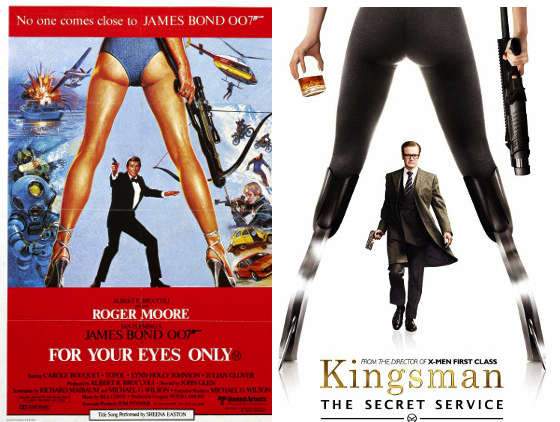 |
| If you look really closely, you might notice a vague similarity here. |
…or why LYT is wrong about the movie.
You can’t go home, no I swear you never can
You can walk a million miles and get nowhere
Artist: Soundgarden
Song: Been Away Too Long
Album: King Animal
Release Date: November 13th 2012
It feels fitting to open this article with lyrics from Chris Cornell, that he wrote for Soundgarden’s 2012 comeback album. Y’see, we’re coming up on the 9th anniversary of Cornell ushering in a new era of James Bond movies. His vocals for the opening to 2006’s Casino Royale set the tone to tell the audience, “Something different is going on here” and get everyone nice and ready for a new type of Bond flick. The Daniel Craig movies fit nicely into a then newish trend of grittier and more down to earth espionage movies, the best example being Matt Damon’s portrayal of Jason Bourne.
I saw Casino Royale on its opening weekend, with my brother and his then girlfriend who is now my sister-in-law. We all loved it. Half a dozen years later, when the 3rd movie in the Craig series Skyfall came out (right before Soundgarden’s comeback album incidentally), we were split. I loved it and was champing at the bit for another one, but they hated it so much that they didn’t want to see another Bond movie with Craig. My brother insisted that they’d gone too far into the grim and gritty territory and it no longer felt like James Bond, so much as James Bond being made to act like Jason Bourne. Now there’s a movie that harkens back to Roger Moore era of Bond, but with a modern spin, it’s called Kingsman: The Secret Service, and it’s a nifty gem of a flick.
Kingsman is a perfect example of what happens when a studio makes a ’60s-ish-Bond-style movie set in 2014, and that (along with how far it deviates from its source material) is probably why it’s getting a smattering of hate around the Internet. TR’s own Luke Y. Thompson wrote a scathing review and talked about how much he hates the movie on a recent podcast. While many of his points are valid, I feel like he missed the mark by a country mile on what the movie is, what it’s meant to be and why it splits the difference between success and failure. Before I can talk about the movie on its own terms though, I’ve got to tell you about the comic which spawned it.
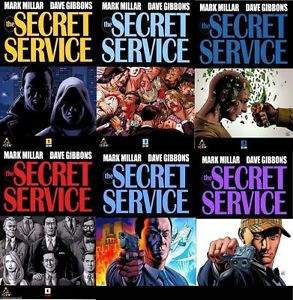 |
If you’re not wanting to get spoiled like a wet sack of moldy bagels, you should go ahead and stop reading now because, SPOILERS ARE ALL UP IN THIS PLACE! Honestly, I’d recommend that you go see it this weekend (which is what I told my brother over the phone this morning), then read Luke’s review and this article to see who you agree with.
Here are the slightly disappointing ways it differs from its source material:
6. The Timeline Is Too Bloody Quick
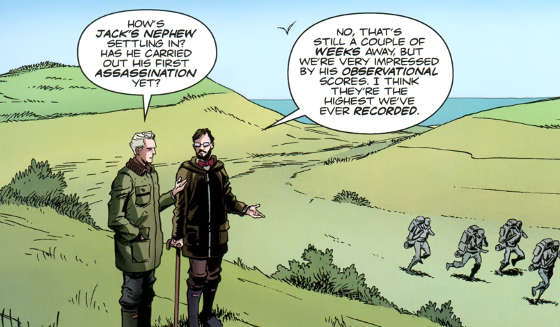 |
Mark Millar’s The Secret Service takes place over the course of 3 years, and it feels like it. Matthew Vaughn’s movie might take place during the same time frame, but it doesn’t feel like it. This is one of the inherent problems with adapting longer-form media to a shorter form like movies. Time-elapsed montages don’t really convey the sense of time passage. It tells us in the audience “This part isn’t really important, so we’re skipping it”. The idea is that we don’t need to see a character becoming a badass, at least not as much as we need to see him/her being a badass.
Here’s the thing, though: The Secret Service is (among other things) a story about someone becoming a badass and how hard a road that can be. Gary (he’s not called “Eggsy” in the comic) starts out as a perennial fuck up in the movie as well as the book, but his rise from fuck up to fucking up bad guys being truncated takes one of the choice cuts out of the story, kind of like a a three meat pizza with only two types of meat. We’ll get to the other two cuts of meat in a bit. First, we gotta look at some of the excised material and why it matters so much…
5. The Best Action Scenes Are Left on the Cutting-Room Floor
Here’s a quick rundown of scenes that didn’t make it into the movie:
– The secret agent killed (in the movie) by Gazelle makes it out of the cabin and has a cool chase sequence on snow mobiles. He and Mark Hamill (who is actually Mark Hamill in the comic, not a fictional character) go off a cliff and his parachute fails to open, resulting in a horrid yet hilarious death.
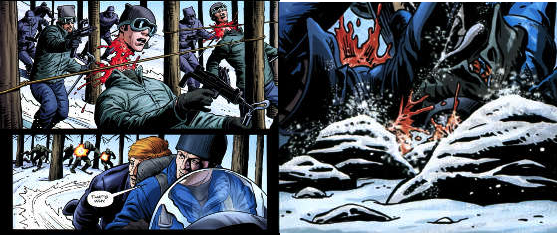 |
– A Hawaiian wedding goes horribly, brutally wrong when everyone starts killing each other. The bride is the last one left standing, but only long enough to get shot in the head by a sniper.
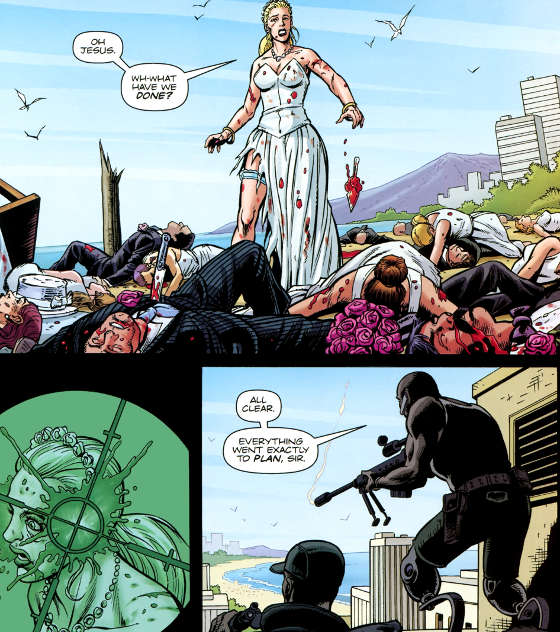 |
– Jack London (known as Harry in the movie) breaks into a facility to get some info on the bloody wedding and fights off some security guards before making a daring escape.
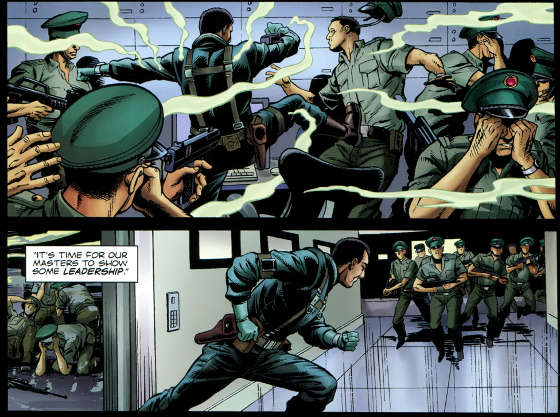 |
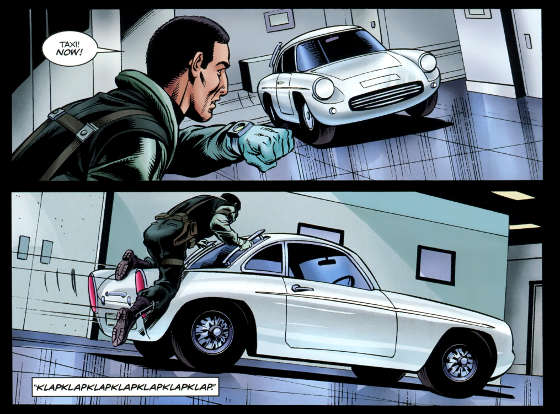 |
– Gary saves the life of his fellow Secret Service students on a mission to kill some drug dealers.
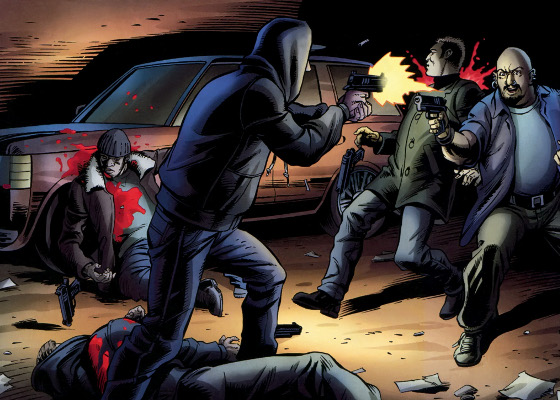 |
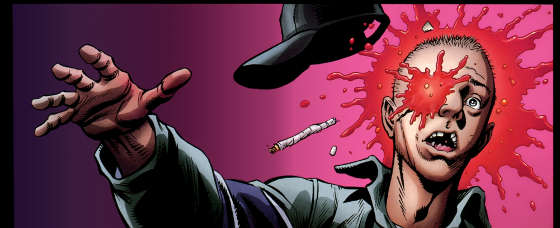 |
– The seduction assignment goes horribly wrong because Gary wears his best hip hop/gangsta clothing to a posh club and looks like a massive twit. He over hears the other recruits talking smack about him and that’s why he steals the super cool spy car. (Trying to get laid counts as an action scene in my book, just a slow-build tension kind of action rather than bombastic, over-the-top action).
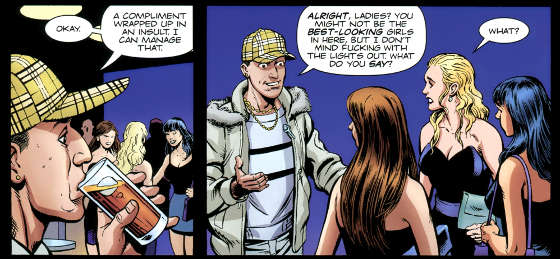 |
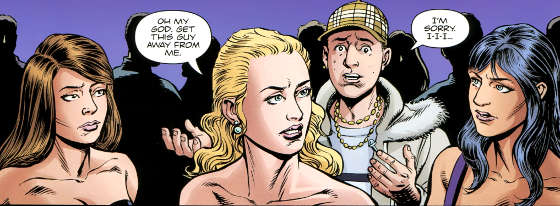 |
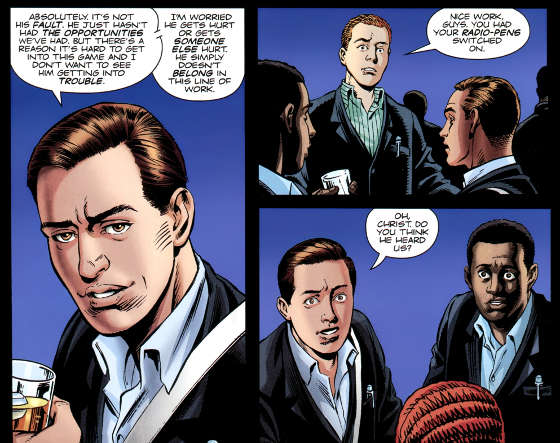 |
– Jack offers Gary one chance to save his ass from getting cashiered out of spy school. Gary accepts and gets knocked out with gas. When he wakes up in Columbia, he’s naked except for underwear and a wristwatch communicator. Jack tells him that he’s got 12 hours to find a passport and get onto a flight back to London. Gary instead raids the home of a local drug lord, kills his guards, takes him hostage, steals his private jet and gets back to London in style.
 |
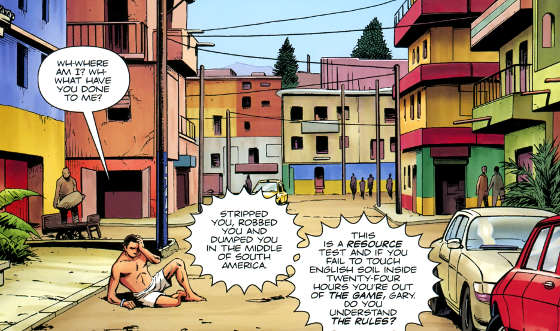 |
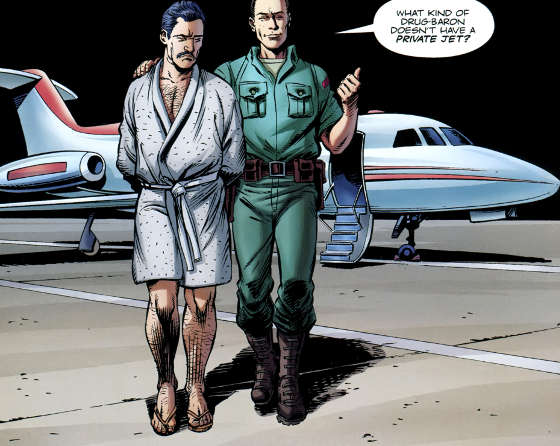 |
– Jack tracks down the girlfriend of the mystery villain, gets her into bed and gets unceremoniously shot in the face through a peephole by the villain’s henchmen.
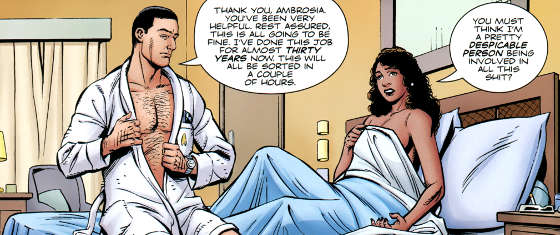 |
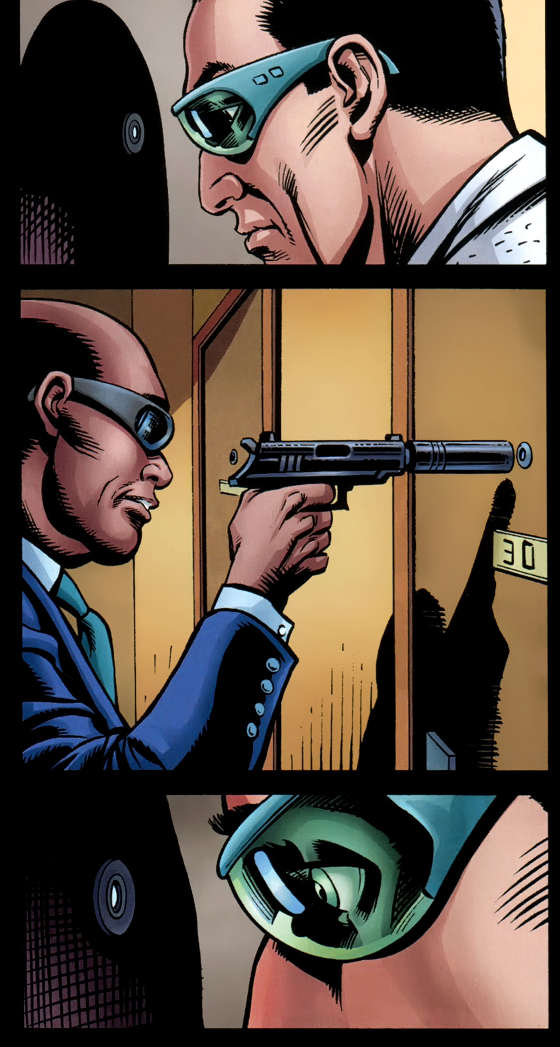 |
– Gary rounds up the whole team of recruits (there’s no elimination process in the comic) to mount a daring raid on the villain’s fortress.
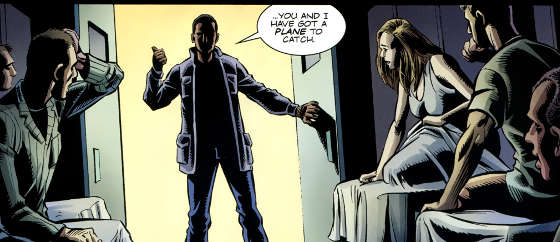 |
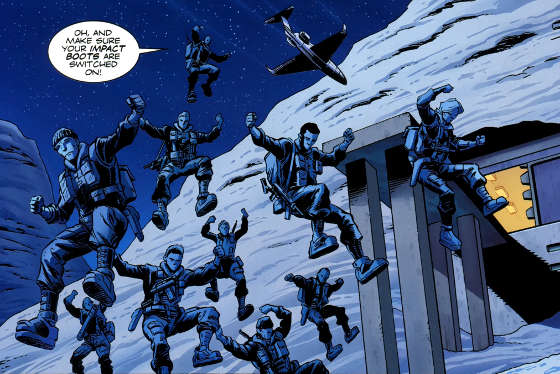 |
– Gary and Gazelle (who is a man in the comic) have a “boss fight” that involves a laser pen and amputation.
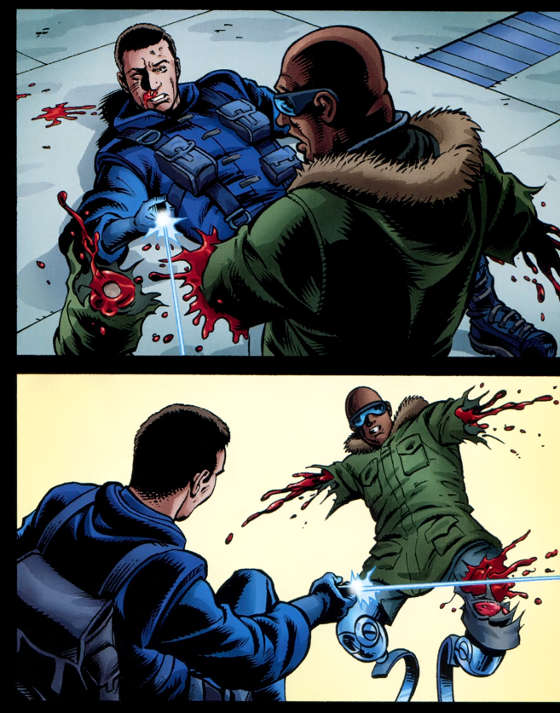 |
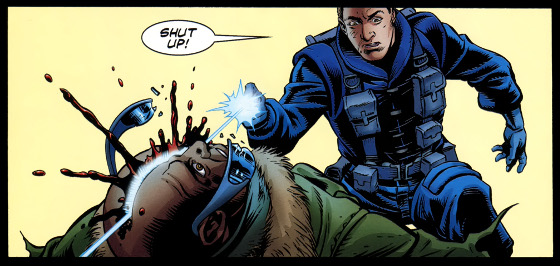 |
– The “make humans kill each other” device is instead altered to “make humans fall in love and kiss each other” and in an amusing amount of restraint, it’s only kissing (I would have expected Millar to go full on orgy, but he was writing this for Icon [Marvel’s equivalent to DC’s Vertigo imprint] so some things can’t be done) and not sex.
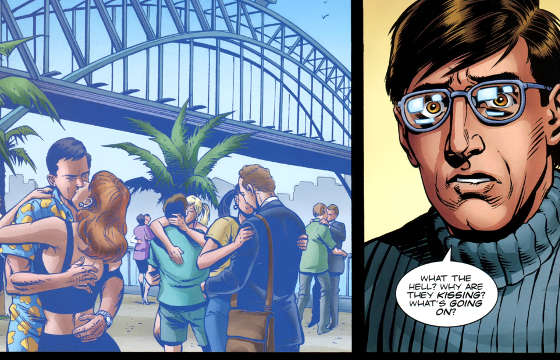 |
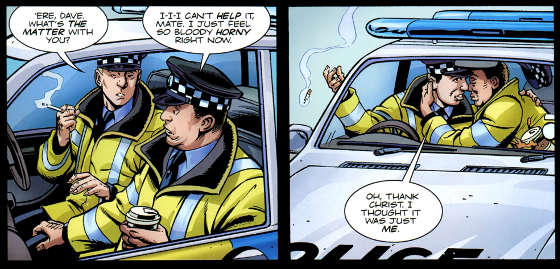 |
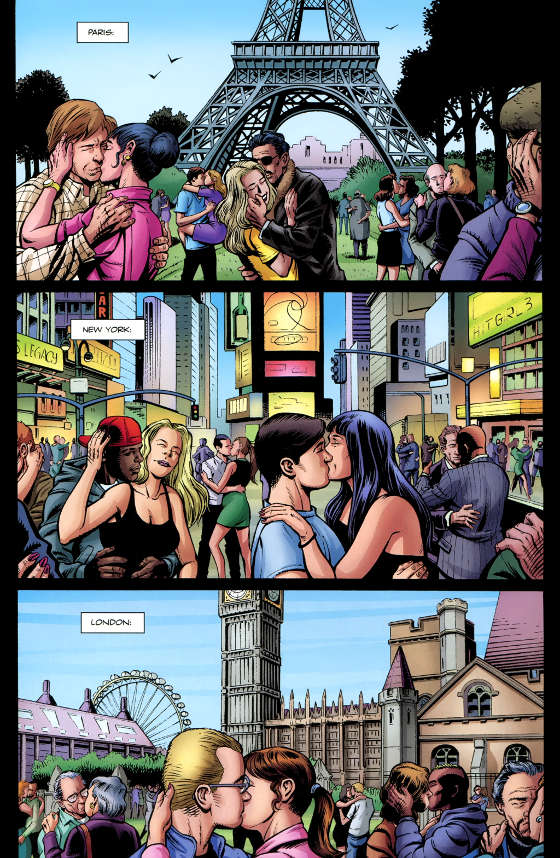 |
It seems likely that budgetary concerns hamstrung the movie severely. It’s still a great flick, but it lacks a lot of the punch of the source material. All of those extra bits makes Gary’s journey from fuck-up-nephew to worthy-replacement-for-uncle-Jack a lot more poignant and meaningful. By the way, if the words “nephew” and “uncle” seem out of place, well, there’s a reason for that too…
4. The Familial Element That Holds the Story Together Is Gone
 |
As you’ve probably guessed by my not-too-subtle hint in the previous entry, the two lead characters in the comic are Uncle and Nephew. Jack is the more successful brother who has to put up with his disappointing sister and her dead end son who isn’t living up to his potential. The scene where Jack bails Gary out of jail isn’t the first time he’s done that. He’s been helping out the kid and his mom for years. As far as they know, he works for the government in an antifraud department and can use his connections to get Gary off the hook. He also has enough income that he can help his family out when they’re in a tight spot, money wise.
Like many poor families with a rich and connected relative, Sharon and her son abuse the situation and expect Jack to give as much as they need or want. When Jack rolls up in a nice car, to bail out her son, Sharon tries to make him feel guilty about it being more expensive than her house (which he points out is one that she doesn’t even pay for, but rather lives in via social welfare). Jack has distanced himself from his family because if he didn’t they’d have dragged him down years ago. Sharon manages to dig her hooks into him enough to guilt her brother into bailing the kid out one last time.
That “last time” is truly meant, which is why Jack decides to take his wayward nephew under his wing and reveal the truth about what he does for a living. In addition to weakening the bond between Colin Firth and Taron Egerton, the story completely loses the tension between Firth and Samantha Womack. The sibling element makes for a strong field to explore that should have been used. The missing moments between sister and brother leave a gap in the character development of “Eggsy”, which is further diminished by not focusing on his favorite kind of music…
3. Most of the Exploration of Chav Culture Is Also Gone
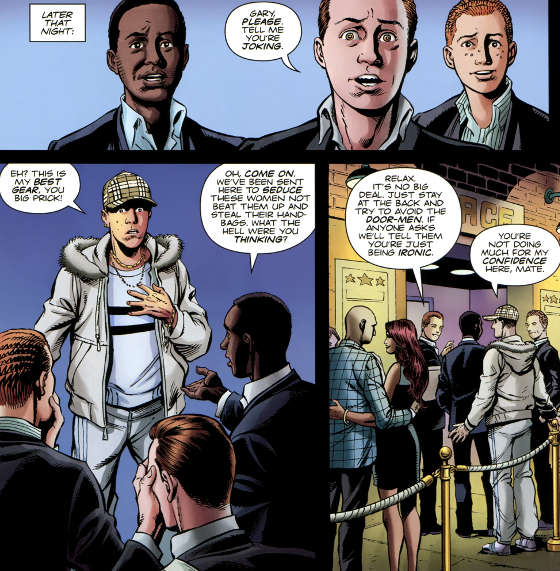 |
For those of you who don’t know what Chav means, it’s the brit slang equivalent to “Wannabe Gangsta” but closer to the racial epithet that starts with W, ends with ER and has three letters in the middle. This was an emotionally resonant bit for me, for quite a few reasons. First off, when I talk to most people about what music they like, the answer is typically “Everything… except country and rap music.” Sometimes it’s one or the other, sometimes both. Being descended from Southerners has given me a deep and sometimes grudging, sometimes beloved kinship with country music. Having a cousin who grew up in Houston, Texas, and is part of the hip-hop lifestyle, along with my appreciation of rap before and after the advent of gangsta (which became harder when my mom married a psycho neo-Nazi arsehole) gives me a deep and often conflicted admiration for that style of music and living.
Certain elements of gangsta culture not only embrace, but seem to glorify poverty. While everyone has “the dream” of escaping poverty, there’s a very real “wake up call” that reminds us that if you escape, the people who are left behind will hate you for it. It’s not a completely across-the-board thing. Some poor folks love to see their family succeed in life and are willing to bust their arses all day and night for decades to help make it happen, even if it’ll only be for their grandchildren’s generation. Much like depression, though, poverty can be very fucking comfortable. It’s often easier to eke by on the bare essentials and a small batch of frivolities than risk the effort of getting a leg up and failing. Seeing someone else succeed when you don’t can be a source of jealousy and bitterness that erodes love and friendship.
Even when someone gets out of poverty, it’s hard to not live like you’re still there. A key scene to demonstrate that is the one I mentioned with Gary showing up at a posh club wearing his hip hop gear. In the kind of clubs he’s run around in, he’d be the cock of the walk. Out in that fancy nightspot ,though, he looks like a fucking prat and he realizes it just a bit too late. His piss-poor attempts at seduction blow up in his face, and hearing his mates talk trash about how he doesn’t belong in their world cuts him to the bone, so to speak. Removing these elements from the movie guts the heart and soul out of the story. What’s left is a tight action movie that’s very polished. Maybe a little too polished…
2. Vaughn Makes Millar’s Story Too Clean
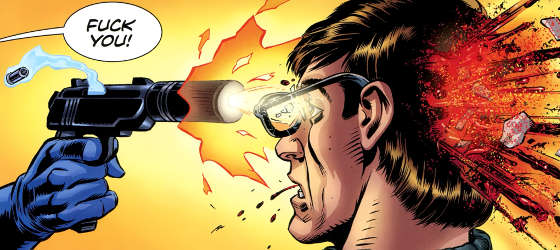 |
One of the great thing about watching Matthew Vaughn adapt the works of other mediums, is that he generally knows what to take out and what to leave in so that the medium of film is best served. When he put Neil Gaiman and Charles Vess’ Stardust onto the silver screen, he kept the spirit of the story, while changing the tune by a great margin. Same thing with the works of Jack Kirby and Stan Lee. X-Men: First Class is the first X-Men movie that looks like an X-Men movie. When it comes to the work of Mark Millar, however, Vaughn does his thing a bit too well.
Kick-Ass is a great example. In the original work, Dave Lizewski (Kick-Ass) is a creepy stalker and Damon McCready (Big Daddy) is a psychologically abusive liar. Dave’s attempts to win over his dream girl Katie Deauxma backfire horrendously. When she finds out that he lied to her about being queer, she has a friend of hers kick the living shit out of him. As he’s dying, Big Daddy confesses to Kick-Ass that Mindy’s mother is alive and well. Turns out he actually kidnapped her as an infant and fed her a bullshit murder story so as to prevent her from being just another vapid consumer. He wanted a grand and adventurous life, and was willing to gain it at the expense of his daughter’s mental health.
Vaughn’s version of events plays better to what an audience would typically want, but at the expense of some very important messages. The comic tells us that A) obsessing over a girl who’s not into you is not a beneficial thing for either person and B) that a real-life, no-shit vigilante would probably be a horribly fucked-up person, and that training a child to be a killer is not an admirable thing. Without likely intending to, I think Vaughn’s movie ends up validating creepy stalker behavior and manipulative child abuse. Big Daddy’s lie is made into truth and his training of a young girl into a serial killer is validated. Meanwhile Kick-Ass is rewarded for his deceptive and unethical behavior by getting laid.
Kingmsan: The Secret Service isn’t nearly as off the mark of the spirit of its source material, but it does offer up a much simpler and less conflicting tale for it’s audience. None of this is to say that Kingsman fails completely as an adaptation, it just slightly underperforms as one.
1. Economic Class Issues and Fun Action Are Really Hard to Mix Well
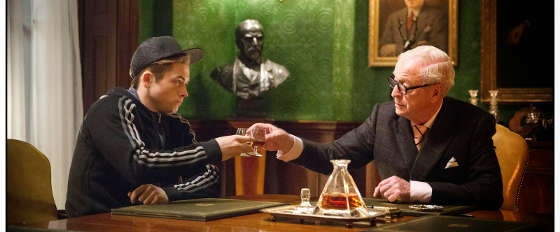 |
While standing by my earlier statements about the story losing its heart and soul with the removal of the familial element and the exploration of Chav Culture, I have to be honest and admit that I can’t think of a way that those elements could have been preserved without turning off a large portion of the audience. The result would necessarily have to be an arthouse indie flick. Movies like that generally do not get the kind of budget that Kingsman had, and definitely not the kind of budget that it needed.
Vaughn does his best to tap into the class differential between Eggsy and his peers, but he only goes far enough to give the audience a standard lynch pin (poor people, if given a leg up can be motha’fuckin’ awesome!), but doesn’t add enough weight onto the pin to drag things down. Most audiences for popcorn movies probably aren’t looking for a deep exploration of the poverty cycle. In the exploration of Eggsy and Michelle’s relationship (her name is changed in the movie for some reason) with her violent 2nd husband, we’re given a glimpse into the world of the poor that succeeds pretty well. Samantha Womack plays a believable abuse victim and deftly portrays how hard it is to step away from an abuser. While it does end up looking more like the poverty is the fault of Gary’s stepdad, he did contribute to it in the comics.
In the end, the exploration of class issues in the movie is imperfect, but decent.
Now, let’s take a look at how the movie succeed on its own merits.
 |
Luke has stated that Kingsman: The Secret Service is a tonal mess. I vehemently disagree. It was marketed with only half of its tone, and that’s not always the fault of the director. Studios often hand the trailer duties over to other companies that don’t take input from the people making the film. Here are the reasons why I think the movie succeeds on its own terms.
4. Acceptable Movie Violence is a Different Arena Than It was 50 Years Ago
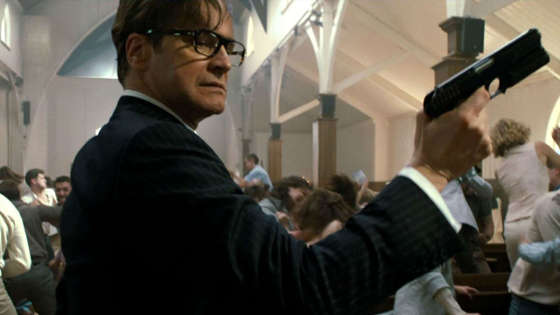 |
Another common complaint is the amount and level of violence in Kingsman. Here’s the thing, though: it’s not noticeably more violent than a Jason Bourne movie, just less reverent with its violence. If Vaughn had gone with a level of violence that would have been acceptable in a Sean Connery or Roger Moore-era James Bond flick, it would look and feel ridiculous. The past few decades have upped the ante enough that the half serious, half silly tone wouldn’t have worked without serious violence.
The violence gets excessive by the end of the movie, and that’s part of the message behind it. The movie is telling us “This is how fucked up the world would be if James Bond level spies were totally 100% real.” A great example that hit a lot of nerves is the “Not-Westboro-Baptist” Church scene, where Harry Hart gets all badass during a test of the “make humans kill each other” device. When a church full of homophobic, anti-semitic, bigoted, hate mongers, listening to the sermon of a vile preacher suddenly turns into a room full of primitive animalistic nutters (and let’s just skip the easy joke here that would imply a lack of difference) Hart is caught up in the mix as well. Being a super trained badass, he takes out every last mo’fo in the room and moves onto the next lead in his assignment.
The scene is controversial for many reasons. Chief among them, is that it steps onto the toes of religion and also seems (to some), to implicitly equate it with a lot of negative stuff. I’ll quote a site I love to look at, just to see how bad they hate stuff I like:
This ultra-violent sequence not only equates the Pro-Life Movement with stupid racists, it also makes angry violence against Pro-Life Christians look “cool.”
From Christian Review Site – Movieguide.Org
Meanwhile Steve Crum ponders:
There is a near endless, disgusting mass murder sequence occurring inside a church that is over-the-top gross. Don’t we get enough of decapitations and shootings on the evening news?
And our own LYT had this to say:
Wait till we get to the part where a fictional version of the Westboro Baptist Church congregation gets flat-out murdered for kicks, in an extended sequence that I think we’re supposed to love.
I’d say that yes, we are meant to love that scene. I definitely loved it, and not just because I’m a nutty guy. Y’see, the problem here is that too many people want to act like Vaughn is condemning all of Christianity, when he’s simply taking pot shots at a very specific branch, that I assure does exist, and does speak with that kind of hateful rhetoric. Every movement, cause, issue or “goal that is bigger than you or I” has it’s zealous wing of awful human beings that are looking for an excuse to do awful things. Pretty much everyone of these groups try their hardest to distance themselves from the psycho fundamentalist, but the fact that the fundies can often cite specific passages from their “holy” books to back up things like queer bashing, rape, slavery, etc. says something very important about holy causes that should not be ignored. I’d estimate that 90% of US Christians aren’t on the same page as Westboro, but the 10% that are… they’re the kind of problem that a group like the CIA or FBI have damned good reasons to be worried about.
If we had a James Bond spy outfit in the world, and a Bondian villain ready to “save the world from itself”, this is exactly the kind of incident we could expect to see happen. Another uncomfortable thing we could actually expect would be novelty henchmen and henchwomen…
3. The Deformed, Deranged and Crippled Are No Longer Easy Targets for Humor
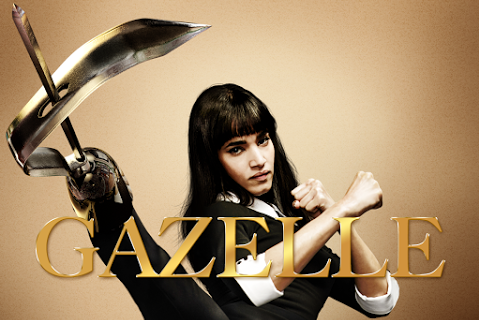 |
During a recent podcast, Luke and other contributors discussed the character Gazelle, who has prosthetic legs that she uses as deadly weapons. The concern was raised that Sofia Boutella (the actor cast in the role) isn’t an actual disabled person. While I’m cool with this, I can see why other people are not. The role could have gone to someone with actual prosthetic legs and it would have been far more impressive a performance. The push for inclusiveness is something that puts some audience members off, but I’m cool with it.
Here’s the thing, though, if we look back to the classic era Bond stuff, Gazelle’s analogs are dead bang obvious. Jaws and Odd Job are the first two that come to mind. Look at Jaws, a guy with metal teeth? Now imagine how people would react to him in a modern movie? Not many, but some people would get upset at the belittlement of people with dental problems. Someone missing her legs is a thornier issue altogether. It no longer seems so funny to have a villain with artificial legs, because we know or know of a lot more people who really have them. Fortunately, Vaughn doesn’t use Gazelle for cheap laughs. She’s a badass henchwoman, and I don’t recall a single joke at the expense of her legs. It was just a quirk for a villain to have. In an older era, there would be a plethora of snappy one liners about her handicap… by older era I mean the 1990s, by the way. If you’ve never seen Wild Wild West with Will Smith… well don’t. But take a look at this clip:
…where he keeps trading verbal jabs with a paraplegic, while the guy in the wheel chair keeps making racial jokes. It’s weirdly discomforting when you realize that audiences were meant to laugh at that scene.
I tip my hat to Matthew Vaughn for not using a disabled character for cheap laughs. Another place where cheap laughter is a common element is with insane villains and henchmen. The person who is unhinged in some quirky and delightful way that makes him or her iconic. That’s another thing that is less funny to modern sensibilities, because many of us know people with mental health problems and it’s harder to laugh at. While certain characters do and say crazy things in Kingsman, none of them are presented as being a specific enough flavor of crazy in such a way as to step on certain toes. So I again applaud Vaughn for not going where others have tread, because the presence of Gazelle reminds us of such times past, without repeating the same mistakes of the past.
2. We Live in an Era That’s Far More Aware of Sexism
 |
One area of Kingsman where laughs might seem to be okay being cheap, is where women are involved. Specifically one woman in particular. Princess Tilda (played by Hanna Alstrom), offers to reward Eggsy with anal sex after he saves her life and the rest of the world. This is something that has turned off a lot of people. Some find it funny, others find it to be incredibly fucked up. It seems that Taron Egerton’s mom actually cried tears of pride over it.
I think the most disturbing implication of the scene is that Eggsy is having sex with a woman who’s been held prisoner for long enough to not be in her right mind. For all we know, the character played by an actor born in Stockholm might have developed some sort of syndrome that leaves her mentally unbalanced and she’ll wake up wondering what the hell she was thinking. It’s worth looking, however, at the scenes that inspired that joke. Think back to every sex joke from a James Bond movie, every similar set up in an action movie… hell think back to every time you saved Princess’ like Peach and Zelda on your Nintendo! Now ask yourself this, aside from being very crude and blunt with its approach, in what appreciable way shape or form is the scene at the end of Kingsman any different from it’s fore bearers? The scene, to my eye, highlights just how fucked up that trope is in action films.
It’s also important to note, that Vaughn put more women into his version of the story than Milllar did, and that he gave them more important roles. Remember what I said about Gazelle being a guy in the comic? Wanna take a guess what Roxy was in the comic? Unless you guess “She wasn’t,” you’re wrong. Roxy was a character invented for the movie. What impresses the hell out of me here, is that she and Eggsy never have a romantic/sexual connection at all. This will hopefully set up a trend where action movies can have a man and a woman be allies without even a hint that they should also be lovers (or at least in the case of Pacific Rim, acknowledge attraction without directly consummating it on screen).
By giving us a “standard Bond girl” for comparison, Vaughn shows us how bad the good ol’ days were for some people. The only thing that impresses me more is the way he spins the lens around to point a mirror at the audience…
1. Sam Jackson Shows Us That We’d Fail as Bond Villains
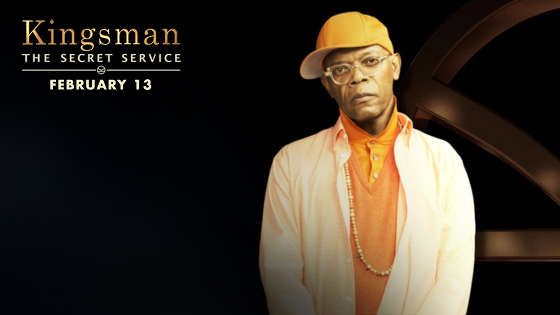 |
It’s worth noting that the villain (who is called Dr. Arnold in the comic and Valentine in the movie) originally looked like a cross between Bill Gates and Steve Jobs. That’s a fair model to use, because at least one of them was used as a personality model for a Bond villain during the Brosnan era. It’s not too clear in the movie, but in the comic Millar is very obviously taking pot shots at the kind of nerds that think they have the world figured out and know what needs to be done to save it… so basically Samuel L Jackson is playing a guy like me (at least in my more bitter cynical moments) but with deeper pockets and the will to actually do the things I only joke about.
An intriguing addition to the villain in the movie is his aversion to blood. The shock and horror he has at the sight of it, especially when he eventually fires a gun himself and kills someone, is a perfect screen capture of the heart and soul of many nerds. We might wish and pray that we could be a badass force of nature, but when shove and push meet up for drinks late at night under a shaky bridge in the bad part of town… we rarely have the “hard man” aspect that we so often idealize. The will to act upon the urge to kill is something that seems to be leaving modern humans behind at a very slow level. The news might tell us otherwise, but that’s just because the decreasing number of crimes are getting a bigger share of coverage that spans a wider range of access.
In Valentine, Vaughn gives us an antagonist we can all relate to. He clearly sees a problem that the powers that be are ignoring because they don’t give a fuck. He has the means to go around them and solve it himself, and when he enacts that plan, it blows up in his face. Doc Hammer (One of the creators of The Venture Bros) once said “…failure is a part of life, and it’s beautiful” or words to that effect. Kingsman gives us a great demo of that principle by showing us a villain who fails by having too much of a conscience. Not enough to stop him from trying to end the world, just enough to stop him from killing his direct opponent before achieving his goal.
That’s the big lesson here. In the modern day world, where most people seem to be switched on enough to know that global politics isn’t black and white, we’re stuck in the wacky spot of knowing that our villains aren’t pure evil and our heroes aren’t pure good. If we’re honest with ourselves, we might realize that more often than not, our heroes are only our heroes when they’re beneficial to our selfish desires.
The next time you hear a friend talking about how cool it’d be to go back to classic Bond era spy movies, ask them if they’ve seen Kingsman and what they thought of it. If you haven’t seen it and decided to read a bunch of spoilers anyway, go ahead and see the movie and let me know if your view of it is closer to my opinion or Luke’s.
Previous Topless Robot Articles by Greggory Basore Include:
9 Comic-Based Sexual Situations Too Bizarre or Risque for Marvel to Put Onscreen
The 9 Most Heartbreaking Moments in Nerdery of 2014
7 Reasons Why The Feud Between “Casual” and “Hardcore” Gamers is Literally Ridiculous.
10 Reasons Why An All Female Ghostbusters Reboot is the Best Possible Direction
10 Reasons Hollywood Needs to Stop Catering to Whiny Assed Nerds like You and Me
The 7 Most Amusing Reactions and Possibilities to come from Microsoft Buying Minecraft
10 Reasons I Don’t Blame Robin Williams for Wanting to Die
The 5 Most Frustrating Moments Game of Thrones Season 4 (and 5 Ways to Wait for Next Year)
The 15 Geekiest Shows of Summer 2014
8 Unanswered Questions Left by X-Men Days of Future Past
5 Lessons Hollywood Should Learn from The Lego Movie (And 5 Ways they’ll Miss the Point)
16 Heartbreakingly Awesome bits of production art that never made it to the screen.
